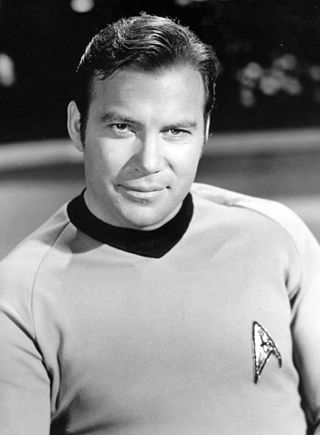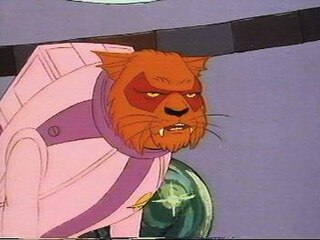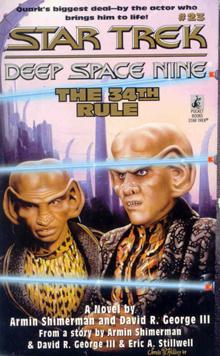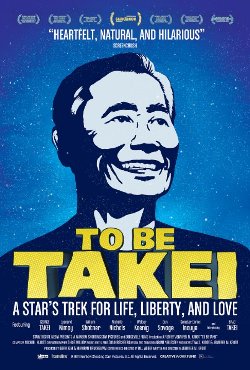
Star Trek: The Animated Series (TAS) is an American animated science fiction television series created by Gene Roddenberry. It originally aired simply under the title Star Trek, subtitled Created by Gene Roddenberry, on Saturday mornings from September 8, 1973 to October 12, 1974 on NBC, spanning 22 episodes over two seasons. The second series in the Star Trek franchise, it features mostly the same characters as Star Trek: The Original Series. Set in the 23rd century, the series follows the further adventures of the Starship USS Enterprise as it explores the galaxy.

James Tiberius Kirk, commonly known as James T. Kirk or Captain Kirk, is a fictional character in the Star Trek media franchise. Originally played by Canadian actor William Shatner, Kirk first appeared in Star Trek serving aboard the starship USS Enterprise as captain. Kirk leads his crew as they explore new worlds, new civilizations, and "boldly go where no man has gone before". Often, the characters of Spock and Leonard "Bones" McCoy act as his logical and emotional sounding boards, respectively. Kirk has also been portrayed in numerous films, books, comics, webisodes, and video games.

Star Trek V: The Final Frontier is a 1989 American science fiction film directed by William Shatner and based on the television series Star Trek created by Gene Roddenberry. It is the fifth installment in the Star Trek film series, and takes place shortly after the events of Star Trek IV: The Voyage Home (1986). Its plot follows the crew of the USS Enterprise-A as they confront renegade Vulcan Sybok, who is searching for God at the center of the galaxy.

Hikaru Kato Sulu is a fictional character in the Star Trek media franchise. A member of the crew in the original Star Trek series, Sulu also appears in the animated Star Trek series, in the first six Star Trek movies, in one episode of Star Trek: Voyager, and in several books, comics, and video games. Originally known simply as "Sulu", his first name, "Hikaru", appeared in a 1981 novel well over a decade after the original series had ended.

George Takei is an American actor, author and activist known for his role as Hikaru Sulu, helmsman of the USS Enterprise in the Star Trek franchise.

USS Enterprise NCC-1701-A is a fictional starship in the Star Trek media franchise. It made its debut in the final scene of the 1986 film Star Trek IV: The Voyage Home.
"The Infinite Vulcan" is the seventh episode of the first season of the American animated science fiction television series Star Trek: The Animated Series. It first aired on NBC on October 20, 1973, and was written by Original Series cast member Walter Koenig. It was the actor's only involvement in the series, as he had not been hired to voice Pavel Chekov in the animated version due to budgetary limitations. With "The Infinite Vulcan", Koenig became the first member of the Star Trek cast to write an episode for the franchise. As with the rest of the first season, the episode was directed by Hal Sutherland.
Sexuality has been a significant theme in the various Star Trek television and motion-picture series. Sexual relationships in Star Trek have mostly been depicted as heteronormative in nature. There have been depictions of bisexual relationships, but always with a twist. In Star Trek Discovery, there were two same-sex marriages, while in Star Trek Enterprise there was a polyamorous character with three wives, each of whom had three husbands, with the marriages depicted as open to romantic and sexual relationships with others.

"Flashback" is the 44th episode of the American science fiction television series Star Trek: Voyager airing on the UPN network. It is the second episode of the third season.

"The Slaver Weapon" is the fourteenth episode of the first season of the American animated science fiction television series Star Trek: The Animated Series. It first aired on NBC on December 15, 1973, and was written by Larry Niven. It was based on his original short story "The Soft Weapon". This episode was expanded to become the first half of a full-length novel by science-fiction author Alan Dean Foster as Star Trek Log Ten.

Star Trek Memories is the first of two volumes of autobiography dictated by William Shatner and transcribed by MTV editorial director Christopher Kreski. In the book, published in 1993, Shatner interviews several cast members of Star Trek: The Original Series and was surprised by the reaction of his fellow actors, who spoke negatively of their experiences with him on the show. James Doohan refused to be involved.

William Shatner is a Canadian actor. In a career spanning seven decades, he is best known for his portrayal of James T. Kirk in the Star Trek franchise, from his 1966 debut as the captain of the starship Enterprise in the second pilot of the first Star Trek television series to his final appearance as Captain Kirk in the seventh Star Trek feature film, Star Trek Generations (1994).

"The Last Voyage of the Starship Enterprise" is a comedy sketch that first aired on May 29, 1976, during episode 22 of the first season of the NBC variety show, Saturday Night Live. The twelve-minute sketch was written by Michael O'Donoghue during a month-long process consulting with actor John Belushi. The sketch is a satire of the 1969 cancellation of Star Trek. The set design featured an effective replica of the bridge of the USS Enterprise. Dress rehearsal was difficult, with the writer doubting whether Belushi was able to pull off an effective parody of William Shatner's performance as Captain James Kirk. However, the result was a success, and O'Donoghue immediately congratulated Belushi after his performance and reflected that he had perfectly parodied Shatner as Kirk.

Allegiance is a musical with music and lyrics by Jay Kuo and a book by Marc Acito, Kuo and Lorenzo Thione. The story, set during the Japanese American internment of World War II, was inspired by the personal experiences of George Takei, who starred in the musical. It follows the Kimura family in the years following the attack on Pearl Harbor, as they are forced to leave their farm in Salinas, California and are sent to the Heart Mountain Relocation Center in the rural plains of Wyoming.

The 34th Rule (ISBN 0-671-00793-9), published January 1, 1999, is a Star Trek: Deep Space Nine novel written by Armin Shimerman and David R. George III. The story in the novel was an allegory for the internment of Japanese Americans during the Second World War, and was inspired by George Takei's experiences during that period. It had originally been pitched as an episode to Deep Space Nine, but was subsequently turned into a novel.
David R. George III is an American science fiction writer. His earliest Star Trek work was the Star Trek: Voyager episode "Prime Factors", and he has since written several novels set in the franchise, including The 34th Rule, three books of the Star Trek: Typhon Pact miniseries and the first book of Star Trek: The Fall.

To Be Takei is a 2014 American documentary film produced and directed by Jennifer M. Kroot. The film had its world premiere at 2014 Sundance Film Festival on January 18, 2014.

A Majority of One is a 1961 American comedy film directed by Mervyn LeRoy, starring Rosalind Russell and Alec Guinness. It was adapted from the play of the same name by Leonard Spigelgass, which was a Broadway hit in the 1959-1960 season, starring Gertrude Berg and Cedric Hardwicke.
"World Enough and Time" is the third episode of the American science fiction web television series Star Trek: New Voyages. It was released on the internet on August 23, 2007, at the same time as a premiere in Beverly Hills, California. It was written by Michael Reaves and Marc Scott Zicree, and directed by Zicree. Set in the 23rd century, the series follows the adventures of Captain James T. Kirk and his crew aboard the Starfleet starship USS Enterprise. In this episode, when a failed Romulan weapons test traps Enterprise in an inter-dimensional rift, Lt. Hikaru Sulu and another crewmate are sent over to the wreckage of the Romulan ships. The anomaly's effect on the transporter causes Sulu to come back 30 years older and with a daughter, Alana.

In the episode of Star Trek: The Original Series titled "Plato's Stepchildren", season 3 episode 10, first broadcast November 22, 1968, Uhura and Captain Kirk kiss. The episode is often—incorrectly—cited as the first example of an interracial kiss on television.
















